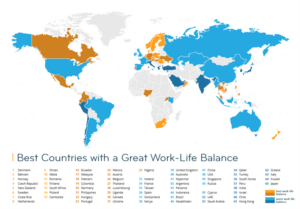News
Denmark has best work-life balance for expats in the world
This article is more than 7 years old.
Short working week among contributors to top ranking

Russia, the US and Australia are all singing the blues (photo: InterNations)
According to the global expat community network InterNations, Denmark is the number one country in the world when it comes to the work-life balance of its expats.
The finding showed that 76 percent of expat respondents in Denmark were satisfied with their work-life balance, while 82 percent were happy with their working hours.
“With just 39.7 hours per week (vs 44.3 hrs globally), expats working full time in Denmark have the shortest working week out of the top 10 countries with a great work-life balance,” InterNations remarked.
“Maybe it’s that benefit which attracts highly educated expats: close to half the respondents in Denmark (47 percent) have a master’s degree or similar. Additionally, twelve percent hold a PhD (vs. 6 percent globally), which is – together with Sweden – the highest share out of the featured top 10.”
READ MORE: Denmark among top nations for women working abroad
Jaded in Japan?
Bahrain was ranked second behind Denmark, followed by Norway, the Czech Republic and New Zealand. The top 10 was rounded out by Sweden, Costa Rica, the Netherlands, Oman and Malta.
Other notables included Finland (12), Germany (20), Mexico (24), Canada (30), France (34), the UK (38), Australia (40), Brazil (45), China (47), the US (48), Russia (50), South Korea (56), India (58) and Japan (65).










































